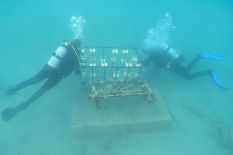University of Vienna news feature on research of faculty member Monika Bright

One of Monika Bright’s research topics was recently featured in a press release of the University of Vienna: the symbiosis of colony-forming ciliates and sulfur bacteria. Monika Bright and her team study this mutualistic association in the shallow waters of the Slovenian Adria. Typically, the symbiosis occurs in environments with high concentrations of hydrogen sulfide, like for instance on submerged wood and decaying sea weed. This is not surprising, since the bacteria utilize hydrogen sulfide to fix carbon. With this process they do not only feed themselves; they also transfer carbon compounds to the ciliates they live in symbiosis with. However, the association separates during winter season, a phenomenon that caught Monika Bright’s interest. With experiments using flow-through chambers, in which the chemical composition of inorganic and organic nutrients can be manipulated and monitored, she and her team want to reveal which factors influence the stability of this symbiosis. How the host and the symbionts react to different conditions can be precisely analyzed using gene expression patterns and Nano-SIMS. Together with in situ experiments in Slovenia, these investigations might be an important step to elucidate the seasonal separation of ciliates and sulfur-bacteria.
Photo: © Monika Bright
